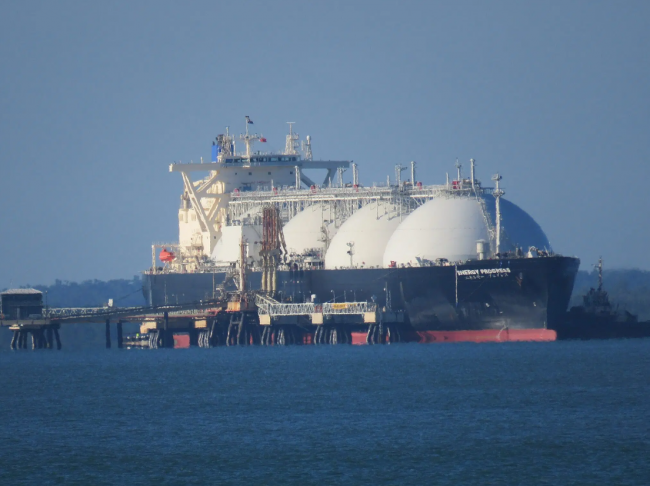Articles Menu

Feb. 15, 2024
Oil and gas companies have for years marketed fracked gas from B.C. as a global climate solution, with some industry boosters even going so far as to call Canada’s supply of the fossil fuel the “cleanest in the world.”
But an impending flood of liquefied natural gas exports from western Canada to Asia could make it harder for countries there to achieve their national climate targets and contribute to tens of thousands of additional deaths due to air pollution.
That’s the assessment of major environmental organizations based in South Korea and Japan, whose representatives told DeSmog that rather than increasing east and southeast Asia’s dependance on an economically volatile and planet-warming energy source it would be much better for the region to shift from coal directly into renewables.
“The argument that liquefied natural gas is helpful for climate action is way outdated,” Dongjae Oh, head of the oil and gas finance program at the Seoul-based non-profit Solutions for Our Climate, told DeSmog. “We need to think about not just stopping the expansion of LNG but how to phase it out as soon as possible.”
Ayumi Fukakusa agrees. She is deputy executive director at the Tokyo-based environmental organization Friends of the Earth Japan. “I don’t believe gas is a climate solution,” she told DeSmog.
These Asia-based energy and climate experts point to the landmark 2021 report from the International Energy Agency which concluded that the only way to stabilize atmospheric warming at the relatively safe threshold of 1.5°C is to stop building new fossil fuel projects.
South Korea is currently the world’s third largest LNG importer and plans to expand its gas capacity 50 percent by 2036. But to reduce South Korea’s emissions in line with the 1.5°C temperature limit, the country must fully phase out gas from its electricity sector over the same time period, Solutions for Our Climate calculates.
If Canada begins shipping huge amounts of LNG to South Korea and other Asian countries, as companies including Shell and Petronas intend to do starting next year, it will impede the shift to truly clean sources of energy. That’s because current market dynamics in the country “motivate the fossil fuel generators to continuously construct new plants and delay the phaseout of those that contribute little to the power grid,” Gyuri Cho of Solutions for Our Climate said last year.
This could have dire health impacts. Because many gas plants in South Korea are located in or near densely populated urban areas, the air pollution caused by expanding LNG could result in 23,000 premature deaths across East Asia by 2064, the organization calculates.
Nevertheless, a $40 billion export facility called LNG Canada led by Shell (and including partners such as Malaysia’s Petronas and the Korea Gas Corporation) could begin shipping LNG from British Columbia to Asian markets including South Korea in 2025. Another west coast facility, Cedar LNG, received environmental approval from the B.C. government last year. There are six additional Canadian LNG export projects in development.

The gas for these projects is projected to largely come from fracking operations in the Montney play, a gas field straddling the Alberta-B.C. border that contains as much as 449 trillion cubic feet of gas. Burning all that gas could release 13.7 billion tonnes of planet-warming emissions into the atmosphere, leading international climate researchers to deem Montney the world’s sixth-largest “carbon bomb.”
Yet this is still being presented by gas advocates as global progress on climate change. “Canadian LNG can help Asia switch from coal to gas, a huge win for the climate,” declared the conservative political advocacy group Canada Action, which received $100,000 in 2019 from the gas producer ARC Resources, a report in The Narwhal revealed.
That message is echoed by the Canadian Association of Petroleum Producers, major business interests such as the Canadian Chamber of Commerce, conservative think tanks like the Macdonald Laurier Institute and rightwing advocacy groups including Fairness Alberta. A report commissioned in 2022 by an Alberta government organization called the Canadian Energy Centre concluded that “Canadian LNG would ultimately help to lower emissions in Asia.”
Channeling this industry marketing push, federal Conservative Party leader Pierre Poilievre said in a speech last September that “we will grant permits for natural gas plants to safely ship it off to replace dirty coal in Asia.” Even ostensibly progressive politicians are on board, with B.C.’s NDP premier David Eby recently defending LNG exports as being consistent with a “clean economy.”
As in South Korea, however, gas expansion in other Asian countries brings only uncertain climate benefits at best, while ultimately stalling the shift towards truly low-carbon energy sources, Fukakusa argues. “If we build new LNG projects we lock in massive amounts of greenhouse gas emissions,” she said.
China, currently the world’s largest importer of LNG, is attempting to meet its ambitious climate goals in part by shifting from coal power plants to gas plants. Gas releases less emissions when burned than coal. But if you include in the accounting methane leaks during fracking and transportation, this “introduces uncertainties in the climate benefit comparison between gas and coal,” a team of Chinese and international researchers noted in a 2020 Nature paper. According to researchers such as Cornell University’s Robert Howarth, gas might even have a climate footprint worse than coal.
That’s why some environmental campaigners in China are wary about the fuel source, as well as recent claims by oil and gas companies such as Shell that LNG can be “carbon neutral” if paired with carbon offsets. “These companies are either walking back previous climate commitments or remain wholly uncommitted to take action on climate,” the Beijing-based Greenpeace East Asia said in a report last fall.
The price of wind, solar and other renewables is falling so quickly that they are now cheaper to install and maintain as electricity sources than gas and coal, meaning that it makes more sense economically for Asian countries to go straight to renewables, Oh said. “Increasing reliance on gas plants is bad economically,” he said.
Japan, the world’s second largest LNG importer, is currently planning to reduce gas in its power sector from 37 percent in 2019 to 20 percent in 2030 while expanding renewables like solar and wind, as well as nuclear power. This means that Canada will have to compete against other gas suppliers like Qatar, the United States and Australia for control of an increasingly shrinking Japanese market.
“I’m not sure it still makes economic sense,” Fukakusa says of proposals to greatly expand Canada’s gas exports.
Climate trackers worry that vast volumes of gas could end up being shipped to Southeast Asian countries like Vietnam, the Philippines and Thailand, stalling their clean energy transitions. But with a wind-down of international fossil fuel financing and strong support for industries like solar and offshore wind, countries across the region wouldn’t require Canadian LNG at all — they could skip the fossil fuel altogether.
“There is a lot of positive potential for renewables across Southeast Asia,” Oh said, “rather than sticking to the risky business of LNG expansion.”
[Top photo: LNG as a climate solution is 'way outdated,' says one South Korean advocate. Credit: Ken Hodge/Wikimedia Commons (CC BY 2.0 DEED)]